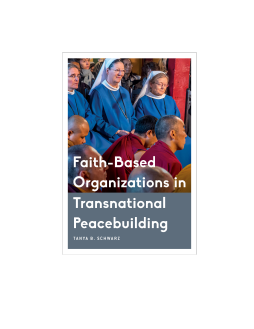
Additional Information
Book Details
Abstract
How do faith-based organizations influence the work of transnational peacebuilding, development, and human rights advocacy? How is the political role of such organizations informed by their religious ideas and practices?
This book investigates this set of questions by examining how three transnational faith-based organizations—Religions for Peace, the Taizé Community, and International Justice Mission—conceptualize their own religious practices, values, and identities, and how those acts and ideas inform their political goals and strategies. The book demonstrates the political importance of prayer in the work of transnational faith-based organizations, specifically in areas of conflict resolution, post-conflict integration, agenda setting, and in constituting narratives about justice and reconciliation. It also evaluates the distinctive strategies that faith-based organizations employ to navigate religious difference. A central goal of the book is to propose a new way to study “religion” in international politics, by actively questioning and reflecting on what it means for an act, idea, or community to be “religious.”
Tanya B. Schwarz is a Visiting Assistant Professor at Hollins University. In 2016-2017, she was a Visiting Research Fellow at the Kroc Institute for International Peace Studies at the University of Notre Dame, where she completed the book. Her research focuses on the role of religion in international politics and she was the winner of the 2017 Peace Dissertation Prize from the United States Institute of Peace. Tanya has published in International Studies Quarterly and the Oxford Research Encyclopedia of Politics.
Schwarz's reflexive analysis of the motivations and practices of faith based organizations sets a new standard for interpretivist research on religion and politics. This book seeks to uncover how these organizations understand their own values and identities and how these, in turn, shape their strategies. Schwarz teaches us not only about religious identity, prayer, and transnational peacebuilding, but about what nuanced international relations research on religion should look like.
Ron E. Hassner, author of Religion on the Battlefield
The issue of the impact of transnational faith-based organisations is both topical and controversial. Tanya B. Schwarz examines transnational faith-based organisations in a particularly controversial and topical context: do such entities 'do good' or are they more likely to 'do harm'? Her perceptive, timely and well-researched book examines an interesting phenomenon: transnational faith-based peacebuilding entities. It will be read with profit by anyone who wishes to understand more about this interesting and under-researched phenomenon.
Jeffrey Haynes, Professor of Politics, London Metropolitan University
Table of Contents
| Section Title | Page | Action | Price |
|---|---|---|---|
| Contents | 9 | ||
| Permissions | 11 | ||
| Acknowledgments | 13 | ||
| Introduction | 15 | ||
| Definitions and Concepts | 21 | ||
| What Do We Know about Transnational FBOs? | 24 | ||
| Reconceptualizing FBO Values, Identities, and Practices from the Bottom Up | 29 | ||
| Organizational Cases and Research Methods | 31 | ||
| Structure of this Book | 36 | ||
| Notes | 40 | ||
| 1 A Reflexive Approach to the Study of “Religious” Values, Identities, and Practices in FBOs | 41 | ||
| Defining Religion | 42 | ||
| Assumptions about FBOs: What is at Stake? | 45 | ||
| A Reflexive Approach to Religion:Religion as Ontological Discourse | 49 | ||
| The Meanings and Roles of“Religion” in Transnational FBOs | 55 | ||
| Conclusion | 69 | ||
| Notes | 70 | ||
| 2 International Justice Mission | 73 | ||
| Background | 75 | ||
| God’s Legal Justice | 77 | ||
| International Justice Mission: A “Christian” FBO? | 90 | ||
| Prayer as an Essential Tool for Human Rights | 100 | ||
| Conclusion | 109 | ||
| Notes | 110 | ||
| 3 The Taizé Community | 113 | ||
| Background | 115 | ||
| Peacebuilding throughReconciliation and Structural Justice | 117 | ||
| Taizé: A Community of Reconciliation | 127 | ||
| Using Prayer to Bridge Divides and Build Trust | 136 | ||
| Conclusion | 144 | ||
| Notes | 145 | ||
| 4 Religions for Peace | 147 | ||
| Background | 148 | ||
| The “Secular” Language of Multi-Religious Values | 152 | ||
| A “Multi-Religious” FBO | 162 | ||
| Multi-Religious Prayer and Peacebuilding | 173 | ||
| Conclusion | 182 | ||
| Notes | 183 | ||
| Conclusion | 187 | ||
| The Meanings and Roles of Religion in Transnational Peacebuilding | 188 | ||
| Approaching FBO Studies with Reflexivity | 190 | ||
| Beyond FBOs: Reflexivity andReligion in International Relations | 193 | ||
| Implications forPeacebuilding Practice and Funding | 197 | ||
| Conclusion | 203 | ||
| Notes | 205 | ||
| Appendix | 207 | ||
| International Justice Mission | 208 | ||
| The Taizé Community | 209 | ||
| Religions for Peace | 210 | ||
| Bibliography | 213 | ||
| Index | 229 | ||
| About the Author | 241 |
